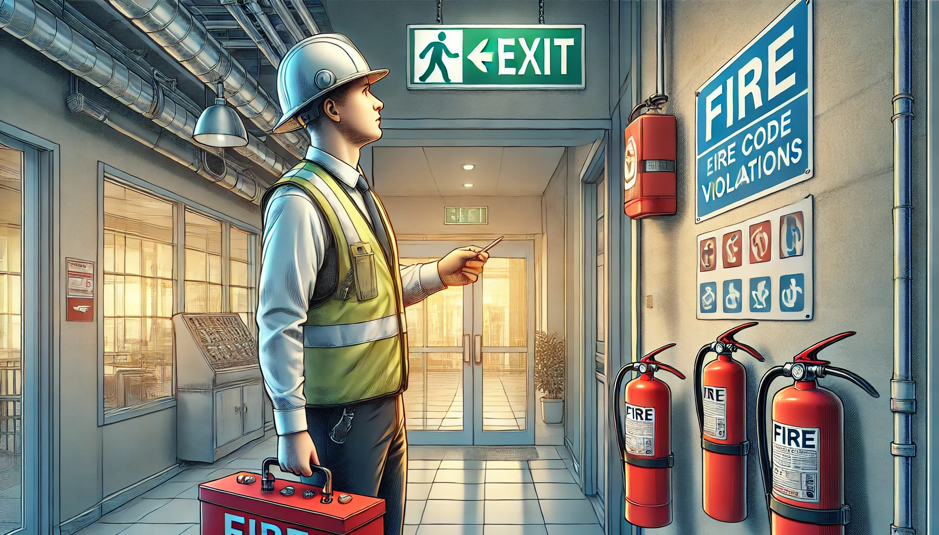
Fire safety is a critical aspect of building management, whether it’s a residential, commercial, or industrial space. Violating fire codes not only puts lives at risk but can also lead to hefty fines, business closures, and legal consequences. Understanding common fire code violations and how to prevent them can help keep your property and occupants safe.
- Blocked Exits and Fire Doors
Violation:
One of the most common fire code violations is obstructing exits or fire doors. This includes stacking boxes, placing furniture, or locking doors that should remain accessible.
How to Avoid It:- Ensure all exits are clearly marked and remain unobstructed at all times.
- Regularly inspect fire doors to confirm they close and latch properly.
- Train employees and residents on keeping escape routes clear.
- Faulty or Missing Fire Extinguishers
Violation:
Buildings are required to have fire extinguishers in designated areas, but they are often missing, expired, or not properly maintained.
How to Avoid It:- Install the correct type of fire extinguisher for the environment (e.g., Class A, B, C, D, or K).
- Conduct monthly visual inspections and annual professional maintenance.
- Train employees and occupants on how to use fire extinguishers properly.
- Overloaded Electrical Circuits
Violation:
Using too many extension cords, power strips, or overloaded outlets increases the risk of electrical fires.
How to Avoid It:- Avoid daisy-chaining power strips or using multiple high-wattage appliances on the same circuit.
- Have a qualified electrician inspect and upgrade wiring if necessary.
- Follow manufacturer guidelines for safe electrical usage.
- Improper Storage of Flammable Materials
Violation:
Storing flammable liquids, chemicals, or combustible materials improperly can accelerate fires and create hazardous conditions.
How to Avoid It:- Store flammable materials in approved, clearly labeled containers.
- Keep them in designated areas away from heat sources and ignition points.
- Follow OSHA and NFPA guidelines for hazardous material storage.
- Non-Functional Fire Alarms and Smoke Detectors
Violation:
Smoke detectors and fire alarms that are missing, disabled, or non-functional can lead to devastating consequences in the event of a fire.
How to Avoid It:- Test smoke detectors and fire alarms monthly and replace batteries as needed.
- Ensure fire alarm systems are inspected and serviced annually by professionals.
- Educate occupants on the importance of never disabling smoke alarms.
- Lack of Emergency Lighting and Signage
Violation:
Emergency exit signs and lighting are crucial for guiding occupants to safety, yet they are often found non-functional or missing.
How to Avoid It:- Install illuminated exit signs and emergency lighting per local fire codes.
- Test lighting systems regularly to ensure they function in case of a power outage.
- Replace burnt-out bulbs and faulty batteries immediately.
- Failure to Maintain Fire Sprinkler Systems
Violation:
Fire sprinkler systems that are blocked, shut off, or improperly maintained may fail in an emergency.
How to Avoid It:- Schedule routine inspections and maintenance per NFPA 25 standards.
- Ensure sprinkler heads are free of obstructions like paint or decorations.
- Keep control valves open and accessible at all times.
- Poor Housekeeping and Clutter
Violation:
Accumulation of paper, debris, and other combustible materials can create fire hazards, especially in workspaces and storage areas.
How to Avoid It:- Keep work areas clean and free of excess clutter.
- Dispose of waste materials promptly in designated containers.
- Follow fire safety policies for proper housekeeping.
- Unapproved or Improper Fire Protection Equipment
Violation:
Using unapproved or outdated fire safety equipment can lead to non-compliance with fire codes.
How to Avoid It:- Ensure all fire protection equipment meets local fire department and NFPA standards.
- Work with certified fire safety professionals for installation and maintenance.
- Keep up to date with changing fire safety regulations.
Conclusion
Preventing fire code violations requires awareness, regular inspections, and proactive maintenance. By addressing these common issues, you can improve fire safety, protect lives, and ensure compliance with local fire regulations. Always consult fire safety professionals and local authorities for specific fire code requirements in your area.
By following these guidelines, you can create a safer environment and reduce the risk of fire-related incidents.





Leave A Comment